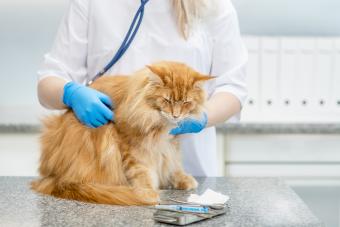
Few things are as frustrating to a loving cat owner as knowing your pet is in pain and not knowing what to do about it. Whether your cat is suffering due to chronic arthritis, an acute injury, or post-surgical healing, there are several available options to help them find comfort.
Veterinary Prescription Cat Pain Relief
Veterinarians can prescribe a number of different drugs to provide pain relief for cats, but none of these drugs should be obtained or used without your vet's guidance. The right medication for your feline depends on their type of pain, pain level, medical history, and your ability to medicate them.
Fentanyl Patch
A Fentanyl patch can be extremely useful for controlling post-surgical pain, and the convenient patch eliminates the need for oral medications. It's also useful for controlling pain in cats receiving cancer treatments.
Fentanyl Patch for Cats Drawbacks
The biggest concern with Fentanyl patch use is that it can slow down a cat's respiratory system with higher dosages, so you need to watch for signs of lethargy and weakness. There's also the possibility of nausea, constipation, and skin irritation at the contact site. If your cat happens to chew or swallow the patch, they could have a toxic reaction, so be sure to prevent your cat from licking or scratching near the patch.
Gabapentin
Gabapentin is a neuropathic and anti-convulsive drug commonly used in human medicine. Although its use in cats and dogs is considered "off-label," its safety and effectiveness for pain relief in animals is well documented.
Issues With Gabapentin for Pain in Cats
There are very few drawbacks to using gabapentin to help with feline pain management. It's so safe, many veterinarians even prescribe it for use in aggressive cats to take the edge off before a vet visit. However, owners should monitor for possible lethargy, ataxia (loss of balance), and stomach upset with this prescription medication.
Prednisolone
A type of corticosteroid, prednisolone is an anti-inflammatory drug useful for treating joint pain and uncomfortable skin irritation in cats.
Concerns About Prednisolone as Pain Meds for Cats
Prolonged use of prednisolone, while sometimes necessary, inhibits the body's own hormone production, which can lead to adrenal insufficiency. Additionally, the drug commonly causes excessive thirst, hunger, and urination in felines. Steroids should not be administered to cats suffering from diabetes and should never be used in combination with drugs classed as NSAIDS. They also inhibit healing, so they're not a good choice for cats with healing wounds or incisions.

Tramadol
Tramadol is an opioid agonist, and is relatively safe to use for pain relief in cats as well as dogs. It effectively blocks pain receptors in a cat's brain and can come in a pill or liquid form, although both are very bitter.
Issues Associated With Tramadol as Painkillers for Cats
Tramadol can cause a number of side-effects, most of them not life threatening. Watch for constipation, upset stomach, and a lowered heart rate. Constriction of the pupils could be an early sign of an overdose, and seizures could follow as it lowers the seizure threshold. Tramadol also should not be used in combination with flea, tick, and mite preventions containing Amitraz as the active ingredient.
Buprenorphine
Buprenorphine is another opioid agonist commonly used in cats. Administration of this drug is fairly easy, as it's absorbed in a cat's oral mucous membranes, so they don't necessarily have to swallow it. So long as you get it onto your cat's tongue or somewhere in their mouth, it'll take effect.
Concerns Surrounding Feline Buprenorphine Use
As with any narcotic, buprenorphine can cause sedation and drowsiness. Cats with progressive liver, heart, kidney, or lung disease may not tolerate this medication, but check with your vet for their recommendation. Again, avoid using products containing Amitraz when using this drug.
Over-The-Counter Feline Pain Relief
With your veterinarian's guidance, you may be able to use an over-the-counter option for your feline friend.
Aspirin for Feline Pain Relief
Aspirin is an all-purpose pain reliever commonly used to treat arthritic conditions. It's also used as a fever reducer, but should be used sparingly for this purpose. This drug is not ideal for use in cats, but it can be given if there are no other options. Check with your veterinarian before giving your cat aspirin.
Concerns About Aspirin for Cats
Aspirin inhibits the blood's ability to clot. Cats don't metabolize this drug very quickly -- a single dose can remain in their system for three days -- so there is a risk of causing an overdose if you give too much. Additionally, aspirin can cause stomach upset and aggravate ulcers. It should never be used in combination with cartilage supplements or other NSAIDS.
CBD Therapy
Cannabidiol-based products are increasingly popular for both humans and pets. Cannabidiol (CBD) is a chemical found in marijuana plants. Although there is not much literature to date supporting CBD use in cats, some people believe it can help with anxiety as well as pain.
Issues Associated With CBD for Cats
It's important to understand that although CBD is reportedly safe in cats, Tetrahydrocannabinol (THC) is not. Owners should seek reputable products designed specifically for felines in order to avoid potentially toxic additives or THC/CBD hybrid formulas.
Alternative Pain Relief for Cats
If you prefer to avoid pharmaceuticals, there are a number of alternative treatments you can try to relieve your cat's discomfort. Most of these methods are non-invasive and have very few, if any, adverse effects or drawbacks.
Magnetic Therapy
The theory behind the use of magnets to treat pain is that the magnets actually deliver a charge to the bloodstream that increases healing oxygen flow. This therapy is usually delivered through the use of a specially fitted magnetic harness, blanket, or device that you place around or over the painful area.
Feline Acupuncture
Acupuncture is a long-standing practice in traditional Chinese medicine that is quickly gaining wide-range acceptance in the West. The treatment involves the placement of extremely small pins along certain meridian lines in the patient's body to help restore the proper flow of energy, known as chi. Pain relief may be accomplished with a single session, but repeat sessions may be called for in cases of chronic pain.

Natural/Homeopathic Remedies
Herbal remedies for pets are on the upswing. There are products touted as safe for felines that contain such diverse ingredients as honey bee sting and yucca to chamomile. Be aware that many of these remedies do not provide immediate relief and require repeated doses to build up in your cat's system to the point where they can be effective.
Heat Therapy
Just as many humans turn to heating pads for pain relief, cats can benefit from the same therapy. You can wrap a towel around your heating pad cover, set the control on low and place it in your cat's bed for them to lie on. For greater convenience, you can even opt for a therapeutic cat bed with heat and massage controls.
Massage Therapy
Gentle body massage increases oxygen flow through the blood and muscle tissues. It also stimulates the production of your cat's own pain-relieving endorphins. A method such as Gua Sha massage can have numerous benefits in addition to pain control.
What Can I Give My Cat for Pain?
Resist the urge to give your cat one of your own over-the-counter pain relievers to help them feel better. The problem is that cats are extremely sensitive to many drugs, even some of the drugs that dogs can take. Note that Ibuprofen is severely toxic to cats and should never be given -- even a small amount can cause kidney failure or seizures.
Before you decide to medicate your cat, give your vet a call to find out if the medication you want to use is safe for felines, and what the correct dosage would be for your cat's weight.







